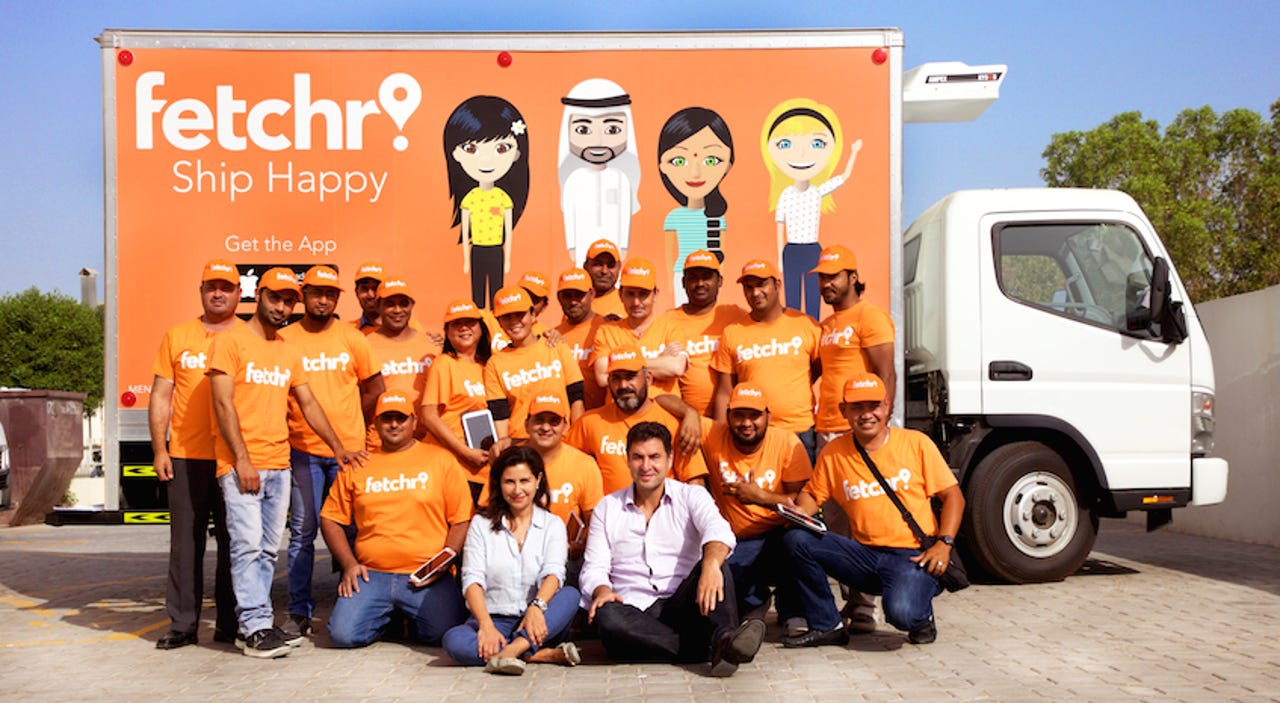Where the streets have no name: The Dubai startup shaking up shipping and ecommerce in the Middle East


A Dubai-based startup, Fetchr, recently announced $11m in Series A funding, the largest such US investment in a Middle East originated app to date.
The funding will allow Fetchr to expand its operation beyond UAE, Saudi Arabia, and Bahrain - to Egypt and other parts of the Persian Gulf - as it seeks to change the business of package delivery in an area where door-to-door courier services do not exist.
Using mobile tech alongside dynamic dispatch and batching, Fetchr hopes its service can help drive the development of online retail in the region. Although governments across the Gulf peninsula have all sought to develop the sector, progress has been characteristically sluggish.
"Lack of postal addresses is a barrier to ecommerce," Fetchr's founders Joy Ajlouny and Idriss Alrifai told ZDNet. "There's no mailman, there's no mailboxes, so how do you get a package?"
That's the logistical problem that Fetchr is using tech to try and solve.
Current set-up
"The way that packages get delivered here in the Middle East, [as well as] Brazil, South America, Russia, hasn't changed in 30 years," Ajlouny says. Based on giving drivers "a bunch of phone numbers and boxes" and not much else, the current system means irate customers frequently field multiple calls from drivers in order to provide directions to their location.
In the Middle East, the situation is exacerbated by the fact that few roads have street names and residential buildings often lack names or numbers. Moreover, directions are often based on major landmarks, even though many of these no longer exist or are known by multiple names.
Dubai Internet City
A roundabout in Doha, for instance, is variously referred to as Post Office, Oryx, or sometimes even Sports Roundabout. Yet, despite being demolished in 2013 - and replaced by a four-way intersection - it is still known colloquially by its previous name(s).
This peculiarity can be hard for people outside the region to understand, yet it's fundamental to the potential behind Fetchr's proposition.
"When we were pitching to people in the United States," Ajlouny recalls, "they found it very hard to understand that there are no physical addresses in the Middle East and emerging markets."
To remedy this, she showed one funder a letter she had received marked simply: 'Joy Ajlouny, Dubai'.
An electronic solution
In the MENA region, being unable to physically reach end users is a challenge for the business to consumer, consumer to consumer, and government to consumer markets. All of these groups can benefit from improvements in last mile delivery.
"In the UAE," Alrifai says, "they have a 20 percent undelivery rate for their Emirates ID and they can't find people, even though these are critical documents."
To remedy this, Fetchr developed a proprietary tech system which schedules package pick-up and delivery using GPS coordinates from a user's mobile.
"We're like Uber," Ajlouny explains, "but instead of picking up a person, we use the same GPS coordinates to deliver packages."
Noting that they "have a preliminary patent filed in the United States and here in the Middle East," Alrifai suggests that using someone's mobile as their address is "a new way to deliver and receive packages".
Its potential, he believes, can help grow ecommerce in "India, Indonesia, and all emerging markets".
Middle East origins, global potential
"We are a technology company that just happens to do shipping," Ajlouny says. They got into this space, Alrifai says, by accident. "Nobody in the market performs to the standards that I want," he says, "so for that reason we have created our own logistics company."
Joy Ajlouny concurs. "I know from my previous company that people would keep coming back to me and saying 'we can't find the customer' and we tried UPS, DHL, TNT and they all had the same problems."
Fetchr's own drivers are currently responsible for 95 percent of their activity, carrying "a couple of thousand deliveries a day". But, with the company's newfound funding, the founders hope to expand rapidly. Using a consumer-facing app which was developed in house by their Dubai-based team, Fetchr aims to be active across the whole of the GCC by the end of the year, with a further expansion into Egypt in early 2016.
"We have a real solution to a real problem," Ajlouny declares, revealing that they hope to be present in 20+ countries in 12-18 months. "We want to go as fast as possible," she says.
Unlocking VC funding
Ajlouny's confidence is underpinned by a belief that ecommerce in the region should be booming. "People are hungry for product," she says, but "the one problem they haven't solved is logistics".
Others share her view, as Fetchr recently announced $11m in funding from New Enterprise Associates (NEA), Delta Partners, Dhabi Holdings, Roland Berger, and 500 Startups. In aggregate, 30 percent of their total funding is now from the Middle East, with 70 percent from the US and UK.
"Investors were really interested in our performance and how to make [delivery] simpler," Alrifai said.
Fetchr customers can use a dedicated app to choose time of delivery, and drivers can also collect an item within 30 minutes of placing an order - all "unheard of here", Ajlouny says.
Statistically, 97 percent of Fetchr's packages are delivered same day or overnight, and they have a two percent return rate, they told ZDNet. The regional average, Alrifai says, "is three to five days, with 20 percent returns rising to 40 percent in Saudi Arabia".
Hard to miss
News of their funding success, coupled with the style and tone of Fetchr's brand, certainly means they're quite hard to miss right now.
"Our drivers wear Orange converse sneakers, t-shirts, and baseball hats. We're very un-Arab," Ajlouny says. "We did that on purpose because we wanted to have that playful Silicon Valley element."
"That differentiates us," she argues, because "we're trying to do something disruptive... you want to grab attention".
With $11m VC dollars in the bank, they've defintely done that.
Read more